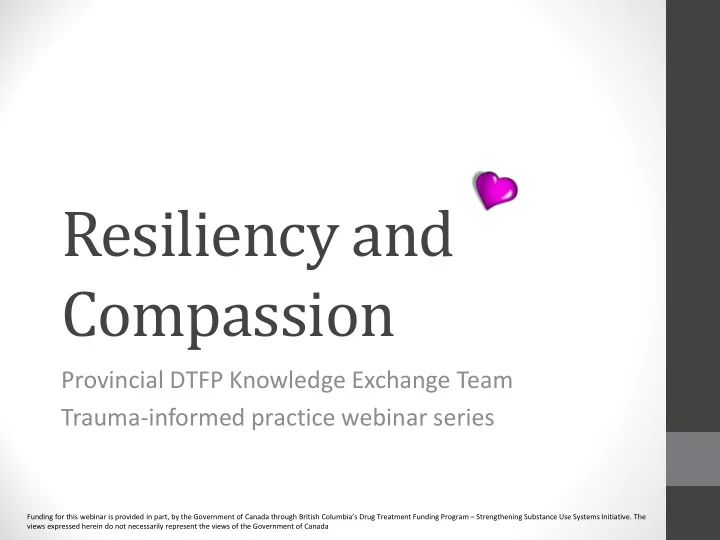

Resiliency and Compassion Provincial DTFP Knowledge Exchange Team Trauma-informed practice webinar series Funding for this webinar is provided in part, by the Government of Canada through British Columbia’s Drug Treatment Funding Program – Strengthening Substance Use Systems Initiative. The views expressed herein do not necessarily represent the views of the Government of Canada
Introduction TRAUMA-INFORMED PRACTICE IN BC
Welcome & Overview • The basis of TIP • The practice of self-compassion • Nurturing self-compassion and resiliency • Dialogue with both panellists
Principles of trauma- informed practice 1. Trauma Awareness 2. Emphasizes safety and trust- worthiness, includes cultural Shifting from: safety “What is wrong” to “What happened” 3. Opportunity for choice, collaboration and connection 4. Strengths based and skill building
Being trauma-informed… Organizational All staff have awareness cultures are of non- of connections between violence, learning trauma, mental health, and collaboration substance use and other for staff /leaders health problems and clients/patients Client behaviours are recognized as All aspects health and adaptations and social care encounters supports/strategies are are receptive and identified to increase supportive, focused on safety and connection. ensuring safety and trustworthiness Practices are universally applied in order to avoiding re-traumatization
Trauma specific & trauma- informed Trauma-specific services are offered in a trauma- informed environment, and are focused on treating trauma through therapeutic interventions involving practitioners with specialist skills. Offer services to clients with trauma, mental health, and substance use concerns who seek and consent to integrated treatment, based on detailed assessment.
Trauma informed services Photo courtesy of VIHA TIP Calendar
Trauma-informed practice at all levels • It is an ongoing process that benefits from collaboration, commitment and cooperation at all • The aim is to minimize levels of service further traumatization delivery. through supporting processes and spaces that build safety and trust
When it comes to supporting and helping people experiencing substance use and mental health related challenges, your most important asset is your own wellbeing.
Becoming Self-Compassionate Tara Carlson, B.A., M.Ed., C.C.C. tcarlson@klinic.mb.ca
Klinic Community Health
Growing Klinic’s Trauma Informed Edge • Trauma Forum (2007) – Found that: • services inadvertently re-traumatized those affected by trauma. • Service providers were seeking information and resources to work more safely with trauma. • Echoed Research – Peter Levin, Bessel van der Kolk, Dan Seigel, Allan Shore
Klinic Resources • trauma toolkit, web based information and videos, guided meditations, apps – http://klinic.mb.ca/about-klinic/resources/ – www.trauma-informed.ca – www.trauma-recovery.ca – http://calminthestormapp.com/
The Evolution of Mind Body Practices at Klinic
Self-Compassion
How do we respond to our own suffering?
Responses to Distress? Of Our Own... • Avoid, minimize, stuff it • Isolate, compare, • Try to fix it, ruminate, • Vent, over-identify • Judge self harshly, anger, fear, shame, self-blame • Eat, sleep, TV, shop, drugs, alcohol, • Defensive, self-harm, suicidal
• That at w whic ich w we e res esist ist p per ersis sists • Pain x Resistance = Suffering
How do we respond when someone we love is suffering?
Responses to Distress? Of Our Own... Of Others... • Avoid, minimize, stuff it • “Be with”, hug, listen (feelings) understanding • Isolate, compare, • Accept, open, comfort • Try to fix it, ruminate, • Concern, kind, caring, • Vent, over-identify kindness, warmth, • Judge self harshly, anger, curiosity, fear, shame, self-blame • Soothing, empathy, • Eat, sleep, TV, shop, sympathy, gentle drugs, alcohol, • Patient, wise, forgiving • Defensive, self-harm, • Love, safety, security suicidal
What is Self-Compassion? • Being in a state of “loving, connected, presence.” • Kristin Neff: – Self-Kindness vs. Self-Judgment – Common Humanity vs. Isolation – Mindfulness vs. Over-Identification
Cultivating Mindful Self-Compassion • Increasing knowledge and addressing misgivings • Formal Practices – Affectionate Breathing – Loving Kindness Meditation – Compassionate Meditation • Informal Practices – Soothing Touch - Self-Compassion Break – Soften Sooth Allow
Practitioner Self-Compassion
Mindful Self-Compassion Reources – http://www.mindfulselfcompassion.org/ – http://selfcompassion.org/ – http://www.centerformsc.org/
Books
EVALUATION AND FEEDBACK YOUR FEEDBACK IS IMPORTANT TO US! Sally Maguet, Evaluation Project Manager Sally.Maguet@bcmhs.bc.ca Funding for this webinar is provided in part, by the Government of Canada through British Columbia’s Drug Treatment Funding Program – Strengthening Substance Use Systems Initiative. The views expressed herein do not necessarily represent the views of the Government of Canada
WHERE CAN I FIND MORE INFORMATION? Provincial TIP Community of Practice webspace info@healthspaces.ca Download the BC Trauma- Informed Practice Guide from www.bccewh.bc.ca Funding for this webinar is provided in part, by the Government of Canada through British Columbia’s Drug Treatment Funding Program – Strengthening Substance Use Systems Initiative. The views expressed herein do not necessarily represent the views of the Government of Canada
UPCOMING WEBINARS WILL BE HELD: DECEMBER 17, 2015 SUPPORTING HEALTH EQUITY AND ADDRESSING STRUCTURAL VIOLENCE WEBINARS FOR 2016 WILL BE HELD ON: JANUARY 21 FEBRUARY 18 MARCH 17 TOPICS TO BE ANNOUNCED Funding for this webinar is provided in part, by the Government of Canada through British Columbia’s Drug Treatment Funding Program – Strengthening Substance Use Systems Initiative. The views expressed herein do not necessarily represent the views of the Government of Canada
FOLLOW-UP CONTACT PEOPLE FROM BC DRUG TREATMENT FUNDING PROGRAM KNOWLEDGE EXCHANGE TEAM Jane Collins jcollins@bcmhs.bc.ca Diane Smylie (Provincial) dsmylie@cw.bc.ca Kat Hinter (Provincial) kat.hiner@phsa.ca Lee Anne Deegan (Northern) Leeanne.deegan@northernhealth.ca Duanna Johnston-Virgo (Interior) Duanna.Johnston-Virgo@interiorhealth.ca Marika Sandrelli (Fraser) Marika.sandrelli@fraserhealth.ca Mary Marlow (Vancouver Coastal) Mary.marlow@vch.ca Michelle Valentine (Islands) Michelle.Valentine@viha.ca SPEAKER CONTACT INFORMATION Tara Carlson – tcarlson@klinic.mb.ca Vicki Kelly - vicki_kelly@sfu.ca Funding for this webinar is provided in part, by the Government of Canada through British Columbia’s Drug Treatment Funding Program – Strengthening Substance Use Systems Initiative. The views expressed herein do not necessarily represent the views of the Government of Canada
Thank you!
Recommend
More recommend